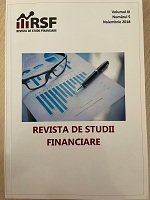Implementation of judicial accounting expertise in the digital context
Implementation of judicial accounting expertise in the digital context
Author(s): Andreea-Cristina Savu, Leliana Diana BolcuSubject(s): Accounting - Business Administration, ICT Information and Communications Technologies
Published by: Editura Mustang
Keywords: Forensic accounting expertise; digitization; accounting; DAC6; ADR;
Summary/Abstract: Romania is currently in an explosive expansion of digitalization created unexpectedly by the COVID-19 pandemic and imposes the need to implement a standardized system in the field of forensic accounting expertise. A digitalized accounting system is essential for streamlining the collaboration between the judiciary and forensic experts. We define digital transformation as the result of fundamental changes in the way literal documentation processes work. This sometimes means moving away from the long-term processes on which the old procedures were built in favour of relatively new practices, which are still undefined. We need a regulatory framework to implement public strategies and policies in the field of digital transformation and the information society. In this sense, a new structure has been organized and operates, the Authority for the Digitization of Romania (ADR), with legal personality within the working apparatus of the Government and under the coordination of the Prime Minister, which includes all departments and services of strategy, coordination, supervision, and implementation in the field of e-government. Analyzing the other branches of the economy we can see areas in which standardized data access systems have been implemented or will be implemented in accordance with the technical requirements of the authorities. An already implemented system can be found in the transfer pricing files where we work in DAC6, an end-to-end cloud solution, which allows collaboration with EU Member States, by reporting xml files. The exhaustive analysis of the situations dealing with the approached subject uses qualitative methods, quantitative methods and the revision of the specialized literature. The aim of the paper is to show how digitization can improve the process of conducting forensic accounting reports, how can justice be more efficient through digitization, what are the challenges of implementing the digitized system in conducting forensic accounting and last but not least what are the aspects of its ethics.
Journal: Revista de Studii Financiare
- Issue Year: 6/2021
- Issue No: 11
- Page Range: 109-121
- Page Count: 13
- Language: English

